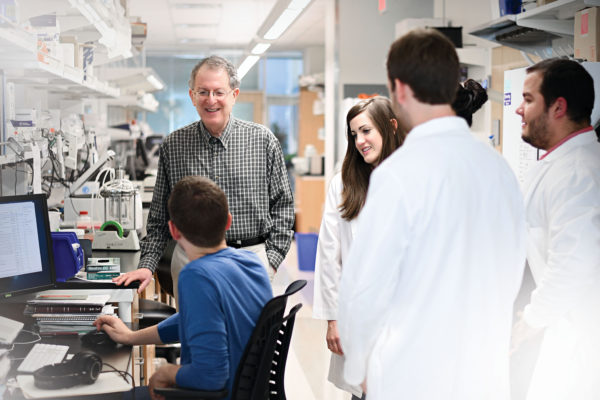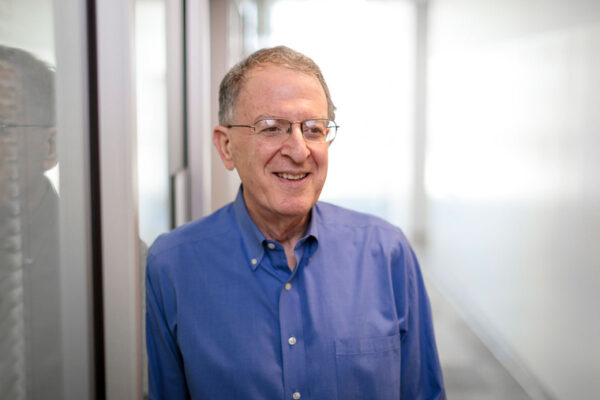Jeffrey I. Gordon, MD, of Washington University School of Medicine in St. Louis, has been named the 2022 Senior Scientist Winner of the Innovators in Science Award administered by the New York Academy of Sciences and sponsored by Takeda Pharmaceuticals.
Gordon, the Dr. Robert J. Glaser Distinguished University Professor, was selected by a jury of some of the world’s leading researchers. Gordon will receive the award in October at the 2022 Innovators in Science Award ceremony in Boston.
“The world is seeing firsthand how innovative science and thinking can improve human health, and we are committed to honoring those who are leading the way,” Nicholas B. Dirks, president and CEO of the New York Academy of Sciences, said in a statement. “The Innovators in Science Award salutes groundbreaking researchers who have developed science-based solutions to debilitating diseases, improving quality of life for people all over the world.”
The award recognizes a promising early-career scientist and an outstanding senior scientist for their contributions to science in four therapeutic areas: neuroscience, regenerative medicine, rare diseases and gastroenterology. The award honors scientists in one of those four areas each year. This is the inaugural year for the gastroenterology award.
Gordon’s research has been instrumental in expanding the understanding of gut microbes from a narrow focus on individual disease-causing species to a broader understanding of how whole communities of gut microbes play central roles in health and disease. Gordon’s work has shed light on how disruption of the development of the gut microbial community in infants and children can contribute to malnutrition, and how targeted repair of these microbial communities can restore healthy growth and development.
Gordon completed his clinical training in internal medicine and gastroenterology at Washington University. For the first 10 years of his career at Washington University, he combined time devoted to practicing clinical medicine with time running his basic science lab in the Department of Biochemistry and Biophysics. He subsequently became head of what was then the Department of Molecular Biology and Pharmacology. Ten years later, he became the founding director of the Edison Family Center for Genome Sciences and Systems Biology.
“Washington University is such a wonderful place to explore the gut,” Gordon said. “This ‘inner tube of life’ is home to a vast array of microbes, a very complex and dynamic repertoire of immune cells, a treasure trove of stem cells that fuel constant renewal of the lining of the intestine, and specialized endocrine cells that discharge myriad hormones to the circulation that control many aspects of our physiology.”
David H. Perlmutter, MD, executive vice chancellor for medical affairs, the George and Carol Bauer Dean and the Spencer T. and Ann W. Olin Distinguished Professor, said he believes that “understanding how the gut develops and interacts with its microbiome, how it functions in health, and how it is disrupted by diseases, including those caused by microbial pathogens, requires an extraordinary interdisciplinary effort, one that brings together people from cell and developmental biology, regenerative medicine, immunology, microbiology and computational sciences/modeling.
“The broad array of intellectual talent together with the collaborative philosophy of Washington University makes possible the basic science and the translational work needed to understand how our microbiome contributes to health and disease. I am so glad that Jeff’s unique innovative efforts to leverage basic understanding of the microbiome for the betterment of healthy development is being recognized by this award and society at large.”
Gordon’s lab began by exploring a developmental biology question: How do the epithelial cells that line the gut and are perpetually renewing know how to express specific functions in different regions of the intestine? To answer this question, he and his students pioneered the use of genetically engineered mouse models. Their results showed that this ‘positional identity’ is shaped in important ways by signals that are not hard-wired within the cells but rather that come from their surrounding environment.
In the 1990s, he and his lab turned to gut microbes for these cues. They started by introducing single species of human gut microbes and then more complex mixtures of species into mice that had been raised under sterile conditions. Gordon’s subsequent work has provided fundamental insights about how gut microbial communities assemble following birth, and how community members interact with one another and with their human hosts.
Working with his longstanding collaborator Tahmeed Ahmed, of the International Centre for Diarrhoeal Disease Research in Dhaka, Bangladesh, Gordon has translated findings from his lab’s animal models to clinical trials involving malnourished children, showing that a therapeutic food designed based on how it nurtures beneficial gut microbes can reverse the detrimental effects of malnutrition, an improvement not seen from typical therapeutic foods.
“This award is a wonderful recognition of the excitement and promise that the field of microbiome research offers, and of the collective efforts of the inspiring group of talented students, staff and collaborators I’ve been privileged to work with as we strive to better understand how the gut impacts our health,” Gordon said.
Washington University School of Medicine’s 1,700 faculty physicians also are the medical staff of Barnes-Jewish and St. Louis Children’s hospitals. The School of Medicine is a leader in medical research, teaching and patient care, and currently is No. 4 in research funding from the National Institutes of Health (NIH). Through its affiliations with Barnes-Jewish and St. Louis Children’s hospitals, the School of Medicine is linked to BJC HealthCare.



